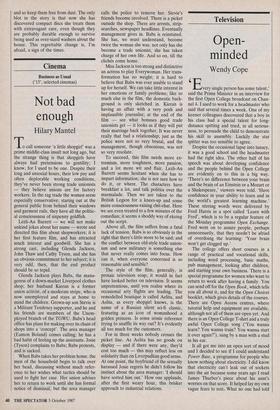Music
Double takes
Peter Phillips
I t seems, what with compact discs and flourishing new labels for the less trad corners of the repertory, that the classical record industry is in a healthy state. The mid-summer holiday slump that I de- scribed in this column a while ago came abruptly to an end on 29 August, for which we must no doubt thank St John the Baptist, on whose day record shops all over Europe started to order for the new season. The scene is set for an exceptional autumn. Even Virgin Records are casting covetous glances in the direction of the classical market, and have quite advanced plans to launch an extensive catalogue just as soon as they can beguile established artists away from their present companies.
I know this because they tried it on me. The circumstances were unlikely: two very informally dressed Belgians approached me during the Bruges Festival last July quoting an instruction from Virgin head- quarters in London that they were not at any cost to employ nglish artists. Perhaps they were trying to put me at my ease. Perhaps English musicians are too ubiquitous/too expensive/not good enough/ not Euro enough. I never did get, to the bottom of it, and was left a little surprised that a company like Virgin (who I was repeatedly assured 'has a lot of money') thinks that there is a sufficient gap in the present catalogue to merit their attention.
Part of my deliberations with these representatives of a foreign culture re- volved around the thopy subject of who was to do the editing of the finished tapes, and how much editing there was to be, if any. No aspect of making a record is as surely calculated to set people at logger- heads than this, since it can reveal a fundamental difference in philosophy. At one extreme is the line that a disc should be a memento of a live concert, at the other that recording is something archival, potentially to last for ever. The implica- tions of the first possibility are that there should be no editing, that just as in a concert it's all-or-nothing for the perfor- mer (except that on this particular occasion it's all) and that the atmosphere is further heightened by having an audience. This way, the theory goes, the listener gets a real interpretation instead of an artificial one and that somehow the result is more honest. The other approach, of course, should yield a version which is under careful technical control, but there is the danger that the edits will be detectable which will help to destroy the illusion that the artist is a super-hero who never makes mistakes.
For the first half of this century editing was not a practical possibility and each side of a 78 rpm record had to be a single take. The early days of editing produced some famous howlers, so that there was never any question that it was better to avoid the things if one could. However, to make one side of a 33 rpm record without an edit was a much taller order than one side of a 78. Hence the idea was promoted that a concert performance, warts and, excite- ment and all, was preferable to a studio recording, even though the latter might have a minimum of editing.
It is not like that now. Digital editing is done in such a way that it is almost always impossible to 'tell where an edit has been made. This may increase the theoretical unease of the purist; but to my mind it is the best possible answer to the problem of making good records, since so often per- formances which seemed wonderfully ex- citing under concert conditions do not bear repetition. The mistakes and the audience interruptions, tolerable when they take the listener by surprise, become intolerable in the course of repeated playings. Inter- pretation is conveyed by mood, and that mood can easily be destroyed by predict- able flaws.
To make records the studio way nowa- days presupposes several takes of every passage, until someone decides that they are as perfect as can be, which must then be followed by some very hard work in the editing room deciding which version should go with which. Put like that, it sounds as though all life must be squeezed out; but I am convinced that if these stages are undertaken sympathetically, for inst- ance intensifying the interpretation with each take rather than getting bored with it, and the editing is done by the performers as part of the creative process, then this is the most effective way to proceed.
Many artists believe that if they can but make one record, they will be established in their profession for life. Having made 28 of them, I know this is not the case. Indeed I am quite certain that everyone, artists, engineers and public alike, take recordings much too seriously. It was refreshing to hear the other day of a friend's mother who has so little respect for her record collec- tion that she periodically lays the bare discs out on the floor in order to hoover them, and so keep them free from dust. The only blot in the story is that now she has discovered compact discs she treats them with extravagant care, even though they are probably durable enough to survive being used as over-sized washers about the house. This regrettable change is, I'm afraid, a sign of the times.



















































 Previous page
Previous page